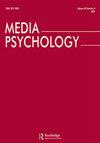叙事中的性格性别与倾向形成:竞争图式的作用
IF 2.6
2区 心理学
Q1 COMMUNICATION
引用次数: 4
摘要
摘要观众如何形成对叙事人物的倾向,是情感倾向理论的核心问题。目前的模型解释了两种途径:图式激活,即观众的倾向基于感知的叙事角色;行为认可,即观众对行为的倾向基于道德认可/不认可。目前尚不清楚的是,相互竞争的字符模式是如何发挥作用的:它们是否在序列过程的同一位置发挥影响?或者,图式对性格形成的影响取决于图式吗?本论文建立在过去的工作的基础上,通过实验诱导来实验操纵图式激活和行为认可。我们扩展了过去的作品,将其英雄/反派模式归纳与另一个:角色性别交叉。在一项初步研究中验证了刺激后,我们的主要实验表明,性别并不能调节英雄/恶棍图式的激活;然而,对于女性角色来说,行为认同更为极端。理论含义表明,各种性格图式在性格形成中可能扮演着不同的角色,而这些区别在当前的理论中没有得到解释。实际意义表明,女性角色可能会引发更强的积极/消极倾向,并通过结果评估过程获得叙事乐趣。因此,好莱坞目前缺乏女性角色的表现可能会损害他们的底线。本文章由计算机程序翻译,如有差异,请以英文原文为准。
Character Gender and Disposition Formation in Narratives: The Role of Competing Schema
ABSTRACT How viewers form dispositions toward narrative characters is a central question of affective disposition theory. Two routes are explained by current models: Schema activation, whereby viewers’ dispositions are based on perceived narrative role, and behavioral approbation, whereby viewers’ dispositions are based on moral approval/disapproval of behavior. What remains unclear is how competing character schemas function: Do they exert their influence in the same location of the serial process? Or, does the impact of schemas on disposition formation depend on the schema? The current paper builds on past work that experimentally manipulated schema activation and behavioral approbation with experimental inductions. We extend that past work by crossing its hero/villain-schema induction with another: character gender. After validating stimuli in a pilot study, our main experiment demonstrated that gender did not moderate hero/villain-schema activation; behavioral approbation, however, was more extreme for female characters. Theoretical implications suggest that various character schemas may have distinct roles to play in disposition formation, with these distinctions being unaccounted for by current theory. Practical implications suggest that female characters may elicit stronger positive/negative dispositions and, through outcome evaluation processes, narrative enjoyment. Thus, Hollywood’s current lack of female character representation is likely hurting their bottom line.
求助全文
通过发布文献求助,成功后即可免费获取论文全文。
去求助
来源期刊

Media Psychology
Multiple-
CiteScore
8.60
自引率
7.10%
发文量
30
期刊介绍:
Media Psychology is an interdisciplinary journal devoted to publishing theoretically-oriented empirical research that is at the intersection of psychology and media communication. These topics include media uses, processes, and effects. Such research is already well represented in mainstream journals in psychology and communication, but its publication is dispersed across many sources. Therefore, scholars working on common issues and problems in various disciplines often cannot fully utilize the contributions of kindred spirits in cognate disciplines.
 求助内容:
求助内容: 应助结果提醒方式:
应助结果提醒方式:


